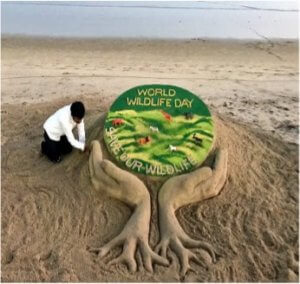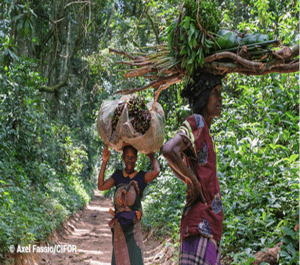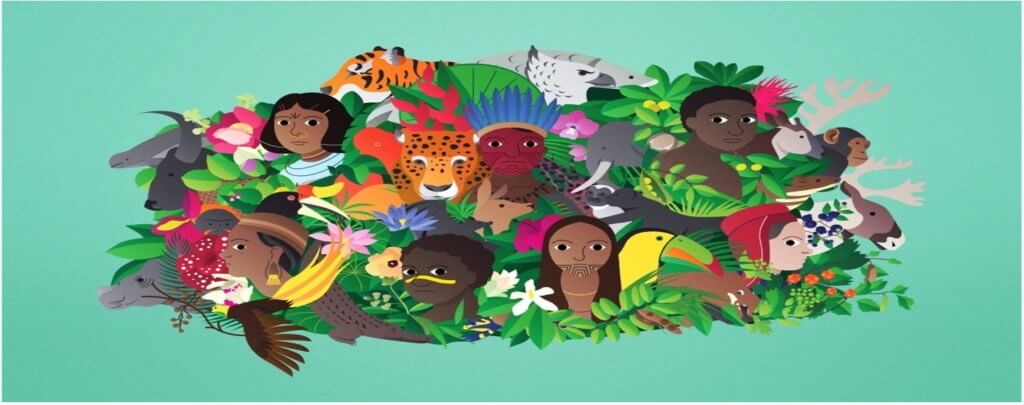By Chelsea Franchette
 The United Nations created World Wildlife Day in 2013 to promote awareness of wild animals and plants, as well as to celebrate these species. This commemorative day is celebrated on March 3. It is now recognized as the most important global annual event dedicated to the world’s wildlife. It draws attention to endangered species and the work that people around the world are doing to save these species and their ecosystems.
The United Nations created World Wildlife Day in 2013 to promote awareness of wild animals and plants, as well as to celebrate these species. This commemorative day is celebrated on March 3. It is now recognized as the most important global annual event dedicated to the world’s wildlife. It draws attention to endangered species and the work that people around the world are doing to save these species and their ecosystems.
On World Wildlife Day, various events occur around the world on different topics in relation to the environment. Some of these topics include wild animals, national parks, nature conservation, plant life, climate change, oceans and marine life, and forests. The events throughout the day are meant to help spread awareness and educate a global audience about the different issues our environment faces.
This year’s World W ildlife Day theme, “Forests and Livelihoods: Sustaining People and Planet,” focuses on how forests, and their species and ecosystems, help sustain people’s livelihoods. Forests affect indigenous peoples’ livelihoods more than any other ecosystem and help indigenous peoples meet their basic needs, including food, shelter, energy, and medicine.
ildlife Day theme, “Forests and Livelihoods: Sustaining People and Planet,” focuses on how forests, and their species and ecosystems, help sustain people’s livelihoods. Forests affect indigenous peoples’ livelihoods more than any other ecosystem and help indigenous peoples meet their basic needs, including food, shelter, energy, and medicine.
The indigenous peoples and the forest ecosystems are highly interdependent. Forests are also facing the challenge of COVID-19’s impacts, which affect indigenous peoples’ health, social interactions, and economic well-being. The forest and the species within it are also battling crises like climate change and biodiversity loss.
Forest ecosystems and forest species can have a significant effect on humans, just as humans can detrimentally impact forests. Humans are the reason for the crises that are affecting our forests all over the globe. Deforestation is perhaps the most significant crisis that forests are facing today due to many factors; however, one main factor is humans’ use of wood. In an interview, Dr. Jonathan Scherch, the Founder and Executive Director of Pacific Bamboo Resources, described his work with this international non-governmental organization (NGO). He explained that bamboo is a resource for people that can be used for other applications to replace wood. This can lead to a reduction in deforestation, which benefits wildlife’s habitats and, ultimately, our planet. Dr. Scherch continued that replacing bamboo for wood not only helps our habitats and wildlife but also has an added benefit in that bamboo has the ability to reproduce quickly. One of Pacific Bamboo Resources’ projects is growing bamboo with farmers near the boundaries of gorilla national parks in Uganda in order to save the mountain gorillas from farmers intruding onto their land to extract the resources they need. When the farmers trespass on the gorillas’ land, they remove the gorillas’ resources and introduce them to diseases. The hope for this project is that farmers can learn how to support themselves without ravaging the national parks, further supporting the species within the parks’ lands.
World Wildlife Day strives to promote forest and forest wildlife management practices. These practices are meant to improve humans’ well-being and forests’ long-term conservation. The United Nations encourages the education and awareness of how our forests and forest wildlife contribute to peoples’ livelihoods all over the world. This year’s IGU symposium has a similar goal.

“UN Wildlife Day is highly relevant to the ‘human rights and the environment’ theme of this year’s IGU symposium. By recognizing the relationship between human and non-human communities and the need for human communities to protect wildlife populations and ecosystem integrity, UN Wildlife Day goes to the heart of the symposium theme. Harm to the environment not only threatens the vulnerable non-human communities on the Earth, but also presents a severe human rights crisis for vulnerable human communities around the world.” — Prof. Randall Abate, Director, Institute for Global Understanding, Monmouth University
The IGU Symposium and the UN World Wildlife Day both highlight our environment’s importance, and how it affects humans and, more specifically, human rights.
